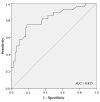Intensive Care as an Independent Risk Factor for Infection after Reconstruction and Augmentation with Autologous Bone Grafts in Craniomaxillofacial Surgery: A Retrospective Cohort Study
- PMID: 34207893
- PMCID: PMC8228131
- DOI: 10.3390/jcm10122560
Intensive Care as an Independent Risk Factor for Infection after Reconstruction and Augmentation with Autologous Bone Grafts in Craniomaxillofacial Surgery: A Retrospective Cohort Study
Abstract
Autologous bone grafts for reconstruction and augmentation are routinely used for maintaining functionality and facial aesthetics. Associated complications, however, have a significant impact on patients and health care systems. This study aims to investigate the possible risk factors associated with the occurrence of complications in order to provide evidence for the outcome of autologous bone graft reconstructive procedures. Patients from 2008 to 2018 who underwent autologous (mostly mandibular) reconstruction were included in the observational study. Clinical, pathological, and therapeutic factors were examined in univariate and multivariate analysis for significance with occurring complications. A multivariate model was used to create a prognostic model predicting the occurrence of complications. Graft complications requiring revision were exhibited by 33/128 patients. Infections were most frequent, with 4/22 patients affected by multi-resistant germs. Multivariate analysis showed radiotherapy (OR = 5.714; 95% CI: 1.839-17.752; p = 0.003), obstructive pulmonary disease (OPD) (OR = 4.329; 95% CI: 1.040-18.021; p = 0.044) and length of defect (in mm) (OR = 1.016; 95% CI: 1.004-1.028; p = 0.009) as independent risk factors associated with graft complications with high accuracy of prediction (AUC = 0.815). Intensive care (OR = 4.419; 95% CI: 1.576-12.388; p = 0.005) with a coefficient between intensive care and OPD (0.214) being low was identified as the most relevant risk factor for infection. Although intensive care is not a classic risk factor, but rather a summation of factors not reaching significance in the individual case, a stay in ICU (intensive care unit) needs to be considered for graft complications. As a clinical consequence, we recommend using the best possible hygienic measures during procedures e.g., while performing dressing and drainage changes in ICU.
Keywords: ICU; augmentation; complication; infection; prognostic model; reconstruction; risk factor.
Conflict of interest statement
The authors declare no conflict of interest.
Figures
References
-
- Ansari E., Chargi N., van Gemert J.T.M., van Es R.J.J., Dieleman F.J., Rosenberg A.J.W.P., van Cann E.M., Bree R. Low skeletal muscle mass is a strong predictive factor for surgical complications and a prognostic factor in oral cancer patients undergoing mandibular reconstruction with a free fibula flap. Oral Oncol. 2020;101:104530. doi: 10.1016/j.oraloncology.2019.104530. - DOI - PubMed
-
- Radwan D., Mobarak F. Plate-related complications after mandibular reconstruction: Observational study osteotomy. OMX. 2018;9:22–27. doi: 10.21608/OMX.2018.5623. - DOI
LinkOut - more resources
Full Text Sources
Research Materials




